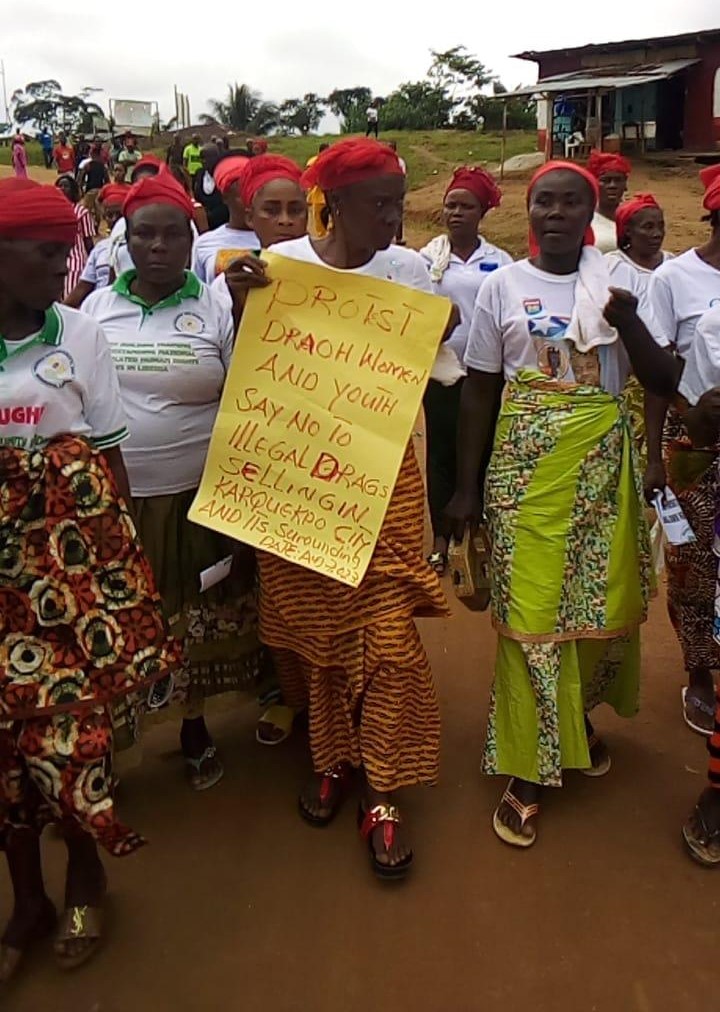PHTOTO: Protesting women
By Alfred Kollie, alfredkolliejr92@gmail.com
Several women of Draoh and Dugbe River in Karquekpo Community, Sinoe County have ended a three-day protest action against the selling of illicit drugs and their trafficking in their community.
Karquekpo community is considered as one of the dangerous areas due to its drug activities, where mostly young people terrorize and victimize peaceful citizens, including women and girls at night and early morning. In their attacks, they reportedly use deadly weapons to take away their valuable items including phones and cash as well as sexually abuse women and girls.
The protest, which began on Liberia’s Flag Day celebration of August 24, ended on the 26th of August, 2023.
Youths in the area later joined the women as well as chiefs, and elders and local authorities, and the joint security in Karquekpo and its surrounding towns and villages in Sinoe saw women and girls parading the town and going without food and bathing for three days.
The three-day peaceful protest was intended to send a clear message to those selling drugs in the community that the community residents were tired and were ready to kick out drug activities in the community.
The protest action was derived by the community as a strategy to prevent sexual gender-based violence as they believe that illicit drug consumption is also a major contributing factor to violence against women and girls in the community.
The community protest action was supported by a local NGO called Women Solidarity Incorporated (WOSI) under its European Union-funded project “Enough Campaign”, which is been implemented with support from OXFAM and the Foundation for Community Initiatives (FCI).
Women Solidarity Incorporated has been working with women and girls in the area since 2020 providing awareness on sexual and gender-based violence, domestic violence, and drug abuse. The group has also been training community dwellers to speak out against violence and abuse as well as engaging the community on positive masculinity and norms among others.
According to the women chairlady, Tanneh Slah, the entire community has agreed to stop the illicit selling of drugs in the community and everyone will serve as security in the community.
She explained that the peaceful protest carried out would help to reduce criminal activities in the area and its surrounding towns and villages where individuals caught selling and trafficking drugs will be held and turned over to the Liberia National Police for further investigation.
“We are outside for three days, no eating and no bathing because we are serious and want them to know that we are ready to kick drugs out of our community because we are tired of suffering in the hands of these boys,” she said.
In remarks, the Project Officer of the Enough Project of Women Solidarity Incorporated, Madam Catherine Nyae, said they are working in four communities in Sinoe to ensure that SGBV is eliminated in those communities through multi-community-driven approaches and that they are gradually succeeding.
According to Madam Nyae, the women want to eliminate drugs from their community because they believe it is responsible for violence against women and girls and domestic violence.
She noted that her organization is working with several communities to make sure that SGBV is reduced or eliminated.
The Project Officer for Women Solidarity in Sinoe however, called on women through their collective effort to do all they can to make sure that their communities are free from SGBV and drugs.
Pres. Weah recently signed the new drug Law
Recently, President George Manneh Weah signed into law the Control Drug and Substance Act of 2023, commonly called the Drug Law.
The President carried out the landmark duty on July 12 after the Drug Bill was recently passed by the National Legislature following months of thoughtful introspections and deliberations.
The new law aims to regulate, restrict, control, limit, or eradicate the illegal export and importation as well as the flagrant use, abuse, and proliferation of narcotic substances within the bailiwick of the Republic.
The law, in part, provides penalties for specified offenses such as the unlicensed and unauthorized importation of controlled drugs or substances into the country.
The law, for example, states that “A person commits an offense if he/she purposely or knowingly imports into Liberia “any controlled drugs or substances without a license from the Government.”
It further added: “The offense of unlicensed importing of controlled drug or substances shall be graded as where the subject matter of the offense is a drug or substances” as prescribed by the Act.
“The person shall be guilty of a felony of the first degree and punishable to a prison of a maximum of ten years and not exceeding twenty years consistent with provisions of the Penal Code 1, section 50.5 and 50.6.”
The new drug law also states that the offense shall be a grave offense and shall not be bailable.

